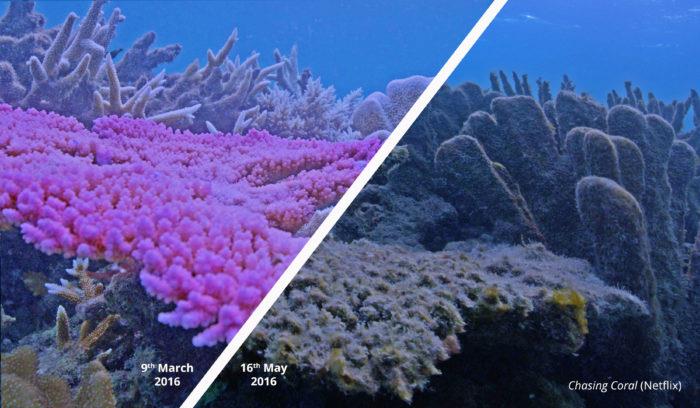
Marine heatwaves a bigger threat to coral reefs than previously thought
by Prof Bill Leggat / Prof Tracy Ainsworth 22 Aug 2019 17:30 BST

Corals before and after a marine heatwave event at Lizard Island, Great Barrier Reef © Chasing Coral (Netflix)
New research reveals marine heatwaves are a much bigger threat to coral reefs than previously thought, with effects that go beyond coral bleaching.
In the study, scientists show for the first time that it's not just coral animals affected during marine heatwaves - their skeletons start to decay within weeks, too. This means 3D coral frameworks, which provide a home for many other animals on the reef, is also at risk.
The study was led by Associate Prof Bill Leggat while he was at the ARC Centre of Excellence for Coral Reef Studies (Coral CoE). He and a team of scientists found severe marine heatwaves not only trigger bleaching events as we've known them—a breakdown of symbiosis—but can lead to a heat-induced death of the coral animal itself.
"Severe heatwave-induced mortality events should therefore be considered a distinct biological phenomenon, with more direct damage, different from coral bleaching," says A/Prof Leggat.
"Until now, we have described coral bleaching as an event where the symbiotic relationship between coral and its microbes breaks down, corals lose their main source of nutrition and the coral can die if the symbiosis is not restored," says co-author Associate Prof Tracy Ainsworth, also from Coral CoE.
In 2016 the team's research showed that just a 0.5 degree C increase in ocean temperature changes the extent of mortality in coral during bleaching.
"But severe marine heatwave events can have a far more severe impact than coral bleaching: the water temperatures are so warm that the coral animal doesn't bleach, in terms of a loss of its symbiosis; the animal dies and its underlying skeleton is all that remains."
"The skeleton is immediately overgrown by rapid growth of algae and bacteria," adds A/Prof Leggat.
"We were able to study the consequences of this process of rapid colonisation using CT scanning of the coral skeleton—as would be used in medical imaging. We show that this process is devastating not just for the animal tissue but also for the skeleton that is left behind, which is rapidly eroded and weakened."
Novel bio-optical techniques allow the scientists to visualise and study the rapid transition in the coral microbiome for the first time.
"With this technique, we can see microbial communities go from symbionts to harmful coral skeleton-dissolvers," says A/Prof Leggat.
He says using such imaging techniques more broadly is central to understanding how this process occurs on reefs globally.
"We anticipate that heatwave mortality events, and rapid reef decay, will become more frequent as the intensity of marine heatwaves increase."
Dr Scott Heron, from James Cook University, says this rapid dissolving of coral skeletons following severe heatwaves is newly discovered information.
"Climate scientists talk about 'unknown unknowns'—impacts that we haven't anticipated from existing knowledge and experience," Dr Heron said.
"This discovery fits into this category. As we begin now to understand this impact, the question is how many more of these 'unknown unknowns' might there still be that could bring faster and greater damage to coral reefs from climate change?" he said.
Dr Mark Eakin, Coordinator of NOAA's Coral Reef Watch, says such events are predictable.
"We already use climate models and satellite data to predict and detect conditions that cause coral bleaching," Dr Eakin explains.
"By focusing on especially severe marine heatwaves, we should be able to predict this direct coral death, too."
A/Prof Ainsworth says that the team hopes this research will motivate the public to tell decision-makers how important coral reefs are to them, to voice the immediate need to preserve coral reefs now.
"Across the globe coral reefs are still a source of inspiration and awe of the natural world, as well as being critically important to the communities that rely upon them," she said.
"Given that the degradation of coral reefs will result in the collapse of ecosystem services that sustain over half a billion people, we urgently need actions both globally and locally that protect and conserve these truly wonderful places."
Paper
Leggat W, Suggett D, Heron S, Fordyce A, Gardner S, Deakin L, Turner M, Beeching L, Kuzhiumparambil U, Eakin M, Ainsworth T (2019). Current Biology. 'Rapid Coral Decay Is Associated with Marine Heatwave Mortality Events on Reefs'. DOI: doi.org/10.1016/j.cub.2019.06.077